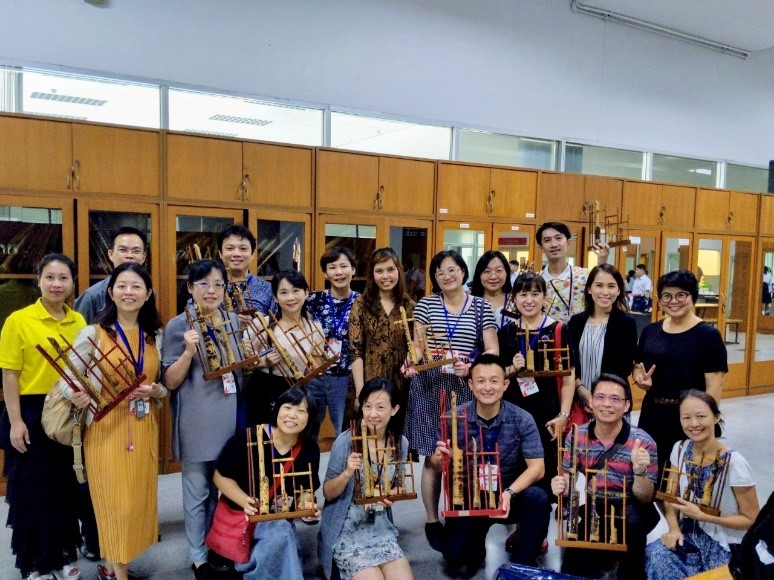Teachers in Aesthetic Education go to Bangkok, Thailand to Explore the Beauty of Art Integrated into Life

The Ministry of Education implemented Overseas Training and Study Visits for Teachers in Aesthetic Education for the first time in 2019, and assigned National Taiwan Normal University to assist in organizing and selecting 60 outstanding teachers in aesthetic education in the primary, junior and senior high schools of our nation. The highest portion of travel subsidy received by each teacher was 39.27%. Three groups of 20 teachers were arranged to visit Thailand, the Netherlands, and Japan respectively to undertake international aesthetic education interchange activities.
On October 15, the group of 20 primary, junior and senior high school teachers, led by the co-principal investigator, Associate Professor Chen Yun-wen, set off on a seven-day aesthetic education training visit to Thailand. There were three featured schools on this visit. First, the founder of the Wells International School, Chairman, Chang Yao-lang from Chaozhou Township, Pingtung County, shared their educational concepts and teaching patterns. This triggered teachers' interests, and they exchanged opinions, and had informed conversational interactions. Secondly, the vice principal of Silpakorn University Demonstration School, Mr. Wisud Po, showed how their school is applying professional learning community (PLC) in developing art-based fundamental courses, where art is incorporated into all subjects. The art-based fundamental courses in Thailand and the interdisciplinary aesthetic courses in Taiwan are nothing more than two sides of the same coin; carved differently, but the same core nonetheless. He said that they will be glad to welcome further bilateral in-depth interchanges. Thirdly, the Srinakharinwirot University Prasarnmit Demonstration School is a top school in Thailand. The representative of the school presented four major concepts of art education development including visual arts, animation, design, and new media art. Students can explore their own talent and enhance their competitiveness, and teachers can visit all sorts of art classrooms, through diverse learning content and abundant teaching resources. Music teachers at the school gave a musical performance using Thai traditional instruments, giving each of our teachers a bamboo flute as a gift, symbolizing cross-border interaction through music. Observing the teaching of art education and sharing course content design offered our teachers specific teaching enhancement of professional competencies, and strengthen their understanding of diverse aesthetic education implementation. Our teachers were also able to get in touch with and comprehend the arts, culture, creative industry, and life in Thailand, through participation in grand art events in Bangkok.
The Bangkok International Performing Art Meeting (in abbreviation BIPAM) is a professional performance art platform in the south-east Asia region. Associate Professor Chen Yun-wen, as a representative of our group, had conversations with artistic workers in the south-east Asia region. She quoted the discourse of Maxine Green, an American educational philosopher, "To summarize, it is, in openings, in unexplored possibilities, not in the predictable or quantifiable, not in what is thought of as social control. For us, education signifies an initiation into new ways of seeing, hearing, feeling, moving. It signifies the nurturing of a special kind of reflectiveness and expressiveness, a reaching out for meanings, a learning to learn." As life is not always happy and carefree, since the 20th century, artistic creators and critics have already extended their definitions of beauty and the arts. While aesthetic education is for the purpose of becoming better people and a better society, there is still room for us to continuously research its contents, boundaries or strategies.
Other activities on the agenda included different art categories such as the performing arts, music, visual arts, and architectural design, as well as various fields including historical and cultural scenes, contemporary art museums, houses, and experience workshops, which contain both refined and popular arts, that is to say, combining traditions and the contemporary. This visit strengthened teachers' teaching competencies and aesthetic literacies, enabling them to apply this to their teaching, resulting in a fruitful learning journey.
To enhance teachers' professional knowledge and skills related to international perspectives and aesthetics, the Ministry of Education organized activities such as class observation and professional interchanges, making every effort to include interdisciplinary fields of vision, music, performing arts and educational courses in the agenda. Not only did this visit unfold bilateral visit opportunities between Taiwan and Thailand, it also resulted in consensus of both countries teachers' belief in devoting themselves to aesthetic education and the bilateral partnership. Enthusiastic bilateral interchanges of teachers' experiences were observed, encouraging and motivating teachers from both parties. In general, the Overseas Training and Study Visits to Thailand for Teachers in Aesthetic Education was entirely moving and impressive! After returning to Taiwan, teachers will share experiences of their visits on campuses through course developments, art creation and lectures. This is estimated to be undertaken before May 2020. It is hoped that educational actions to transform diverse students' aesthetic experiences and cultural knowledge and skills can encourage students' autonomous learning motivation and passion, cultivating them with deep seated education in this core literacy. To promote and expand the outcomes of the international visit, the project team also expects to have further interactive dialogue with society, so as to further carry out aesthetic education for all people.
